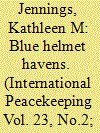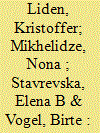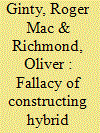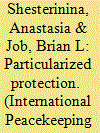|
|
|
Sort Order |
|
|
|
Items / Page
|
|
|
|
|
|
|
| Srl | Item |
| 1 |
ID:
143798


|
|
|
|
|
| Summary/Abstract |
It is commonly argued that international peace interventions will work better and more empathetically if the prevailing separation between international interveners and local people is lessened. However, I argue that, outside the microeconomic interactions and transactional relationships that comprise the peacekeeping economy, peacekeeping is characterized by bypassing – intentional circumvention – or simple exclusion of the local. Drawing on fieldwork in Liberia and the Democratic Republic of the Congo, I argue that the rules and regulations, norms and architecture of UN peacekeeping all favour and are actively disposed to bypass or exclude. Accordingly, insofar as lessening the separation between internationals and locals is necessary to enable more effective and, ideally, empathetic peacekeeping, what is needed is systemic change that runs counter to the – mostly deliberate – policies that have been enacted to effectuate and retain this very separation over the past decade or more. The likelihood of such change is small.
|
|
|
|
|
|
|
|
|
|
|
|
|
|
|
|
| 2 |
ID:
143797


|
|
|
|
|
| Summary/Abstract |
From a peacebuilding perspective, EU support for civil society organizations (CSOs) in conflict-ridden countries can be criticized for artificially boosting a liberal, ‘bourgeois’ civil society at the expense of more representative initiatives at the grassroots level. Seen from a governance perspective, however, this criticism is lacking in nuance and conceals the actual rationale and effects of the support. To advance a realistic debate on international peacebuilding as a form of governance, this article investigates what the character and effects of EU support for CSOs in conflict-ridden countries actually are: how does it affect the relations between the supported organizations and (1) the wider society, (2) the state and (3) between the recipient country and the EU? We consider four ideal types of EU conflict governance: ‘liberal peace’, ‘hollow hegemony’, ‘vibrant hegemony’ and ‘post-liberal peace’ and compare them to empirical data from Bosnia and Herzegovina, Cyprus and Georgia. We find that while the objectives of promoting peace and democracy through CSO support tend to fail, the strategic interests of the EU are still maintained.
|
|
|
|
|
|
|
|
|
|
|
|
|
|
|
|
| 3 |
ID:
143795


|
|
|
|
|
| Summary/Abstract |
This article reviews the recent academic and policy interest in hybridity and hybrid political orders in relation to peacebuilding. It is sceptical of the ability of international actors to manufacture with precision hybrid political orders, and argues that the shallow instrumentalization of hybridity is based on a misunderstanding of the concept. The article engages in conceptual-scoping in thinking through the emancipatory potential of hybridity. It differentiates between artificial and locally legitimate hybrid outcomes, and places the ‘hybrid turn' in the literature in the context of the continued evolution of the liberal peace as it struggles to come to terms with crises of access and legitimacy.
|
|
|
|
|
|
|
|
|
|
|
|
|
|
|
|
| 4 |
ID:
143799


|
|
|
|
|
| Summary/Abstract |
The problematic nature of biased knowledge held by professionalized experts and aid workers in statebuilding is already recognized. Yet we still lack understanding on knowledge formation and transfer in the everyday of statebuilding operations. I argue that the actors on the ground gain their knowledge in powerful and self-referential socialization processes. The aim of this article is to reconstruct via an interactionist theoretical framework, how German police officers, deployed for a maximum of 12 months, perceive and interpret other actors and their mission in Kosovo, how they gain this knowledge and how it relates to their work. I draw two conclusions: first, the police officers, both experienced and newcomers, share mostly negative attitudes towards local actors and the mission. Second, the most important mode of knowledge formation and transfer behind these similar attitudes is the informal interaction with experienced interveners and local actors, not official trainings or information. These informal modes of knowledge transfer have a limiting effect on the practice of statebuilding. New knowledge is difficult to gain in short-term deployment, instead stereotypes are reaffirmed. Interveners are not independent units and the social practice of an operation cannot simply be planned; it develops on the ground in specific forms.
|
|
|
|
|
|
|
|
|
|
|
|
|
|
|
|
| 5 |
ID:
143796


|
|
|
|
|
| Summary/Abstract |
The protection of civilians at risk in armed conflict has, since the late 1990s, become institutionalized at the United Nations (UN), gaining acceptance as a normative rationale for UN peacekeeping. However, the bulk of civilians in need of protection in armed conflict are unlikely to attain it. The article develops an argument on ‘particularized protection' – particularized in that UN Security Council (SC) mandates are formulated and adjusted over time to direct mission protection to specific subsets of civilian populations, that is, those relevant to the UN itself, the host state, other states, NGOs and the media, leaving most local civilians receiving little effective protection. Particularized protection, we argue, is a result of the institutional dynamics involving actors producing mandates – the UNSC – and those providing protection – peacekeeping missions – whereby mandates are specified to direct mission protection to selected, particularized groups. We demonstrate these dynamics in two cases, Côte d'Ivoire and Somalia.
|
|
|
|
|
|
|
|
|
|
|
|
|
|
|
|
|
|
|
|
|